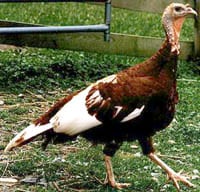Heirloom turkeys and biodiversity
By Charles Finkel, Slow Food
This article was originally published in November 2002

The loss of biodiversity in turkeys is no less dramatic than what’s happened in the plant kingdom. Historically, about 10,000 plant species have been used for human food. Today, about 150 plant species make up the diets of most of the world’s people. Of these, just 12 provide more than 70 percent of our food.
(November 2002) — Among turkeys, the negative trend began after World War II. Turkeys are said to be one of, if not the most hybridized of all domestic animals. Almost all turkeys, including those grown organically, are of only one variety, the American White.
They’re been bred for large breasts of evenly colored white meat and quick, efficient growth; they bear little resemblance to their noble, beautiful, and delicious heirloom ancients — Bourbon Red, American Bronze, Jersey Buff, and Narragansett.
Today, these heirloom varieties are endangered. The American Livestock Breeds Conservancy (ALBC) estimates that there are fewer than 500 pair of American Bronze breeding stock still in existence.
In 2000, I traveled to the University of Bologna to see the ALBC receive the Slow Food Award for its work in the diversity of farm animals. A talk about the lack of biodiversity and the conditions under which domestic turkeys are factory raised, hit home.
As a result of the awareness brought about by the award, the four heirloom varieties named above were nominated to the Slow Food Ark. It may seem odd to be asked to eat a bird that’s endangered, but that is exactly what Slow Food is doing. If people were willing to pay a premium price for these smaller, slower to mature and more delicious birds, farmers would have more incentive to grow them once again.
It was the job of each Slow Food convivium to identify a local grower, not always an easy task. The Seattle convivium contacted Wish Poultry in Oregon to consider a win/win relationship. After hosting an early spring turkey tasting with Bronze turkeys cooked by local celebrity chefs Christine Keff of Flying Fish, Jonathan Sundstrom of Earth and Ocean, and Mike Duppenthaler of Blue Ribbon Cooking School, members were convinced that these birds were superior in flavor, taste, texture and color to their factory farm cousins.
A fair price was established with Wish and pay-in-advance orders, now in the hundreds, were accepted among Slow Food members. The bronze birds, purchased directly in Oregon to comply with complicated state bureaucratic regulations, will be delivered by Slow Food volunteers just before Thanksgiving.
The long-term goal of Slow Food is not to market turkey directly. It is hoped, that as the project grows, PCC and other stores may discover enough demand to begin offering these delicious birds.
